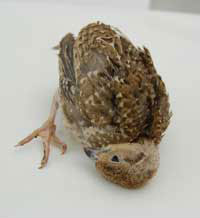



Avian Encephalitic Listeriosis
An investigation by AHVLA into a rare infection of red-legged partridges with Listeria monocytogenes, which cause neurological symptoms.Background
Listeria monocytogenes is a well-recognised bacterial cause for encephalitis in ruminants. In birds, outbreaks of clinical disease due to L. monocytogenes have only sporadically been described and then they mostly presented as septicaemias. L. monocytogenes is a food-borne zoonotic pathogen but transmission to man is predominately associated with food processing rather then infected animals.
Clinical Signs

Affected red-legged partridges exhibited neurological signs including torticollis, head tilt and incoordination (Figure 1). Avian notifiable disease, specifically Newcastle disease could not be ruled out on clinical grounds but subsequent official laboratory investigations were negative.
Disease Control
There was no change in morbidity following treatment with various antibiotics, and therefore the efficacy of antibiotic treatment was unclear.
Good standards of hygiene and biosecurity are likely to reduce spread and minimise any zoonotic risks.
AHVLA Investigation
Following scanning surveillance investigation by an AHVLA Surveillance Centre, encephalitic listeriosis due to L. monocytogenes was diagnosed by bacteriology and histopathology in red-legged partridges from one flock in England.
Investigations into the origin of the infection have not yet been concluded. However, the investigations to date have raised the possibility that the birds may have been infected either at the hatchery or during transit, and unknown risk factors enabled disease to develop.
Further Reading
| - | You can find out more information about avian encephalitic listeriosis by clicking here. |
September 2011








